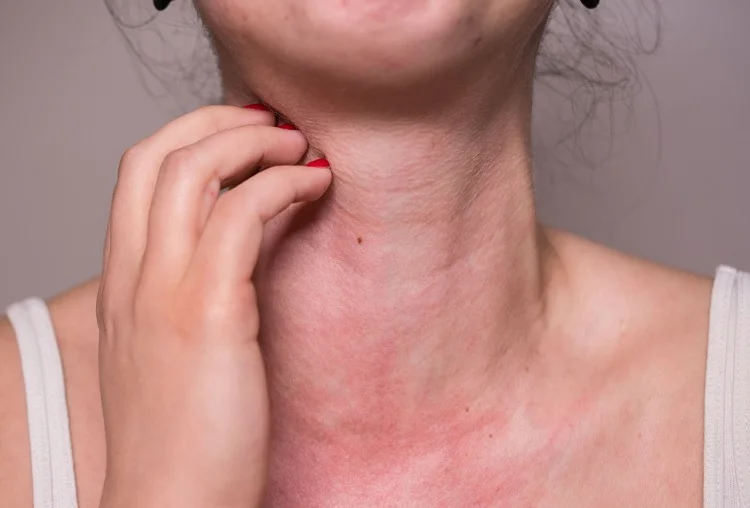Last Updated on: 10th December 2025, 06:44 am
Can poor dental health cause eczema? In this article, we will tell you how skin allergy may be associated with changes in oral health.
The skin is the largest organ in the body, responsible not only for protecting the organism from the external world but also for connecting it through the sense of touch. In addition, the skin regulates body temperature and prevents dehydration by storing fluids. Skin diseases diminish the quality of life and can become disabling.
What is Eczema?
It also known as dermatitis is an inflammatory skin condition. It manifests in various areas and often with a different visible appearance.
What is Dermatitis?
The most common form of eczema is atopic dermatitis, associated with dry skin, redness, itching, swelling, cracking, and scaling. It can also cause small bumps or fluid-filled blisters. It can be generated when certain substances come into contact with the skin, and it occurs only in the area affected by the allergen or material that caused the allergy.
What is Oral Health?
Normally, when talking about oral health, it is common to think of perfectly white and aligned teeth. But the truth is that oral health is more than that. We talk of good oral health when the state of the structures of the mouth, such as the gums, teeth, mucosa, and tongue contribute to the physical, mental, and social well-being of a person, by allowing them to interact with others, speak, chew, taste food, and smile.
The following factors can affect oral health:
• Caries: The presence of holes in the teeth can cause pain, infections, and even the loss of teeth.
• Gingivitis: Inflammation of the gums causes them to bleed and increase in size.
• Periodontal disease: An advanced infection in the bone that supports the teeth can cause it to break down, leading to mobility and tooth loss.
It is important to know these dental diseases to avoid serious complications or damage to your oral health. We have a comprehensive guide about gingivitis and periodontal disease, their differences, and their causes.
How are Dental Health Problems and Eczema Related?
All parts of the body are interconnected by various systems, including the circulatory and lymphatic systems. It is believed that when infections occur in the mouth, they can cause changes in certain components of the blood and the way the body defends itself against infections, which could lead to dermatitis.
1. Dental infections and eczema
According to a study conducted in 2007, 30% of a group of participants who presented dermatitis that did not respond to conventional treatment had active dental infections. Eczema resolved after treating the dental infections.
2. Gingivitis and eczema
It has been found that bleeding gums could be related to eczema. In several cases, the eczema resolved after treating the gingival inflammation.
3. Caries and eczema
Deep cavities can cause tooth decay and lead to major infections and abscesses, and as already mentioned, they could lead to dermatitis. On the other hand, although studies carried out with the Biomedical Research Center have shown that babies with skin allergies have a higher risk of developing cavities in the future, the relationship between these two diseases is still not clear.
Can Poor Dental Health Cause Eczema?
In dentistry, multiple materials and supplies are used that could cause dermatitis in uncommon cases when coming into contact with the skin.
During the dental consultation, two types of dermatitis can occur:
1. Allergic
When the skin comes into contact with substances that are not normally irritating but trigger an unfavorable skin reaction as a result of an allergy. Allergies are immunological disorders in which the immune defense system overreacts to substances that are not harmful. They usually occur delayed, that is, they do not appear immediately after contact with the material, but a few hours later.
2. Irritant or non-allergic
This happens when coming into contact with very irritating substances such as soaps or acids, which normally trigger inflammation on the skin of any person.
What Dental Materials can Cause Skin Allergy?
1. Latex: It is found in gloves and other supplies, such as the dams used during root canals. Latex allergies can trigger mild or severe reactions, which are usually not immediate.
2. Metals: For the manufacture of restorations, implants, appliances, permanent dental prostheses, and orthodontic wires, alloys of various metals such as nickel, chromium, cobalt, and platinum are used, which can irritate allergic patients.
3. Resins: This material is used to make dental restorations. Ultraviolet light is used for its hardening, but if this process is not carried out properly, it could generate an allergic reaction when it comes into contact with the tissues of the mouth.
4. Acids: In procedures such as resin restorations or dental whitening, acid substances are used that may cause skin irritation.
5. Alginate: It is a paste that is used to make models of the mouth before the manufacture of dental prostheses and orthodontic treatments.
How to Improve Dental Health to Prevent Skin Diseases?
1. Brushing your teeth 3 times a day with fluoride toothpaste helps to significantly reduce the risk of dental cavities, infections, and gum disease, which thereby decreases the possibility of developing eczema associated with oral health problems.
2. Attend periodic dental check-ups, so the dentist can detect dental problems in time.
3. During the dental consultation, inform the dentist if you suffer from any known allergies so that he or she can take the necessary measures.
4. If you have allergies to several substances, it is advisable to consult a doctor to perform tests to identify other materials you might be allergic to, avoiding future hypersensitivity reactions.
Conclusion
• Although the relationship has not been fully established, it is believed that oral diseases, especially infectious diseases, can cause dermatitis.
• During a dental consultation, it is possible to come into contact with materials that cause changes in the skin; therefore, it is important to take into account the aforementioned precautions.
• It is advisable to maintain good hygiene and oral care habits since the mouth is connected to the rest of the body. Therefore, certain oral diseases could generate not only dermatitis but other general diseases.
Frequently Asked Questions
Are oral diseases related to dermatitis or eczema?
Yes, oral diseases can be related to dermatitis or eczema. Infections in the mouth can lead to systemic changes in the body, potentially triggering or exacerbating skin conditions like eczema. Studies have shown that treating dental infections can help resolve dermatitis that does not respond to conventional treatments.
Does atopic dermatitis affect oral health?
Atopic dermatitis itself does not directly affect oral health, but the discomfort and challenges associated with managing the condition can lead to neglect of oral hygiene. This neglect can result in oral health problems such as cavities, gingivitis, and periodontal disease. Additionally, some medications used to treat atopic dermatitis can cause side effects like dry mouth, which can negatively impact oral health.
Can HSV-1 in the oral cavity cause recurrent eczema?
HSV-1 (Herpes Simplex Virus-1) in the oral cavity can cause recurrent oral herpes, which may exacerbate or trigger eczema, especially in individuals with a predisposition to skin conditions. The viral infection can cause skin irritation and inflammation, potentially leading to eczema flare-ups.
Is odontogenic infection an aggravating factor in treatment-resistant eczema?
Yes, odontogenic infections can be an aggravating factor in treatment-resistant eczema. Studies have found that dental infections can contribute to persistent eczema that does not respond to conventional treatments. Addressing the underlying dental infection can help resolve the skin condition.
Can dental care cause eczema?
Dental care itself does not typically cause eczema, but certain materials and substances used during dental procedures can trigger allergic reactions or irritant dermatitis in susceptible individuals. For example, latex gloves, metals used in dental restorations, resins, acids, and alginate can cause skin reactions. Informing the dentist about any known allergies and taking necessary precautions can help prevent such reactions.
Share:
References
1. Eczema. (2000). Skin, Hair and Nails. https://medlineplus.gov/eczema.html
2. Lai, A. (Jun 12, 2020).How can hidden dental issues affect your skin? (part 1) – the eczema podcast (S4E11). Eczema Conquerors | Natural Remedies for Eczema; Eczema Conquerors. https://www.eczemaconquerors.com/how-can-hidden-dental-issues-affect-your-skin-part-1-the-eczema-podcast-s4e11/
3. Tanaka, T., Satoh, T., & Yokozeki, H. (2009). Dental infection associated with nummular eczema as an overlooked focal infection. The Journal of Dermatology, 36(8), 462–465. https://onlinelibrary.wiley.com/doi/10.1111/j.1346-8138.2009.00677.x
4. Childhood tooth decay and eczema are linked. (Feb 27, 2017). Southampton BRC. https://www.southamptonbrc.nihr.ac.uk/post/childhood-tooth-decay-and-eczema-linked
5. Lugović-Mihić, L., Ferček, I., Duvančić, T., Bulat, V., Ježovita, J., Novak-Bilić, G., & Šitum, M. (2016). OCCUPATIONAL CONTACT DERMATITIS AMONGST DENTISTS AND DENTAL TECHNICIANS.Acta clinica Croatica, 55(2), 293–300. https://doi.org/10.20471/acc.2016.55.02.17
6. Raap, U., Stiesch, M., Reh, H., Kapp, A., & Werfel, T. (2009). Investigation of contact allergy to dental metals in 206 patients. Contact dermatitis, 60(6), 339-343. https://www.sciencedirect.com/science/article/abs/pii/S0733863518301566?via%3Dihub
-
Nayibe Cubillos M. [Author]
Pharmaceutical Chemestry |Pharmaceutical Process Management | Pharmaceutical Care | Pharmaceutical Services Audit | Pharmaceutical Services Process Consulting | Content Project Manager | SEO Knowledge | Content Writer | Leadership | Scrum Master
View all posts
A healthcare writer with a solid background in pharmaceutical chemistry and a thorough understanding of Colombian regulatory processes and comprehensive sector management, she has significant experience coordinating and leading multidisciplina...



















